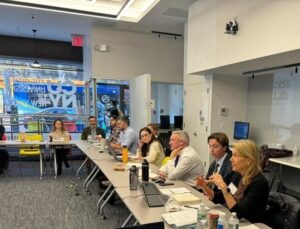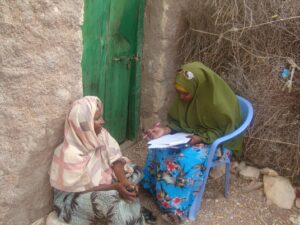By: William Bradford, Business Development
Opinion research plays an important role in policy making. Across the world, opinion research provides key insights into policy development through qualitative and quantitative studies. At ORB, we emphasize the integration of perspectives from hard-to-reach and hard-to-survey populations into policymaking so that marginalized populations have a seat at the table. ORB recognizes the importance of including these populations for effective policymaking, and our opinion research supports policymakers to incorporate these viewpoints into their policy design. By listening to the voice of all stakeholders, policymakers can create and implement policies that better address the needs of their constituents.

Photo 1: ORB presenting results of our 70-country vaccine confidence study
What Is Opinion Research?
Opinion research is the process of discovering people’s thoughts, feelings, and desires through surveys, focus groups, and interviews.1 When conducted effectively, it allows researchers to accurately depict a group of people for actionable policy recommendations. Opinion researchers use two main research methods: quantitative and qualitative.
Quantitative research involves large-scale representative surveys that draw from a representative sample of the population. To do this, researchers define the target population, ensuring that everyone in the population is equally likely to be selected to participate, and choose individual respondents to be surveyed. The value of this process lies in the fact that a large, well-designed sample can be used to describe the entire population of interest.
Qualitative research, on the other hand, involves smaller-scale methods like focus groups, in-depth interviews, and other observations. Participants are selected based on project-specific criteria and meet to discuss topics of interest over an extended period of time. Researchers then identify the key themes and ideas driving the discussion by analyzing the transcript from each group and individual interview. The value of this process is that researchers can gain an in-depth understanding of the topic of interest, including causes, effects, and outside ramifications. Combining both quantitative and qualitative research enables researchers to achieve several objectives:
- Identify people’s needs,
- Understand public sentiments, and
- Measure the impact of social policy.
Picture 1: Conducting fieldwork in Mexico
Identify Needs
Opinion research can aid policymakers to identify and understand the needs of target populations. This is important for specific development initiatives that seek to address these needs and improve the quality of life of program participants. For example, ORB conducted a study to understand the perceptions of breast cancer among Low- and Middle-Income Countries (LMIC) countries, which revealed key barriers to awareness of the deadly disease. Understanding these barriers enables more effective intervention strategies and optimizes resource allocation and impact. This study helped global health workers to effectively target programming at the most effective junctions and adequately use resources for the most impact.
Similarly, understanding people’s needs can reveal threats to local and international security. A study conducted by ORB in 2023 uncovered imminent water scarcity in Chad. Not only does this allow aid workers to better target their efforts, but it also helps us to understand salient security threats in the regions. Water insecurity could allow for violent extremist organizations (VEOs) to expand in power and influence through recruitment incentives and resource control.2 By addressing these needs proactively, policymakers will be able to provide aid before VEOs can exploit this vulnerability, curbing the potential for VEO proliferation.
Understand Public Sentiment
Opinion research uncovers public sentiments about current issues, trends, and events. This is useful in predicting situations such as the 2023 military coup in Niger or in providing context to rising pro-China sentiment in Panama. Opinion research can also help to explain why some people in the EU were skeptical about the COVID-19 vaccine. Whether its predicting changes in political dynamics or perceptions on global health issues, this knowledge allows for tailored solutions that accommodate diverse perspectives and mitigate potential unrest.
Policy Impacts
Opinion research plays a vital role in measuring the impact of policy interventions. For example, ORB conducted a program-wide impact evaluation for the Tony Elumelu Foundation (TEF). We measured outputs and outcomes to understand how effective TEF has been in empowering African entrepreneurs. Furthermore, we uncovered areas to improve the program’s impact in the future. ORB has also conducted evaluations for a wide range of projects, including trafficking-in-person programming, messaging campaigns, and countering violent extremism (CVE) programming. These evaluations have given policymakers valuable insight into their impact, recommendations for improving program effectiveness, and justification for further action.
Photo 2: Conducting fieldwork in Somalia
Conclusion
Opinion research serves as a powerful tool for informed policymaking, offering valuable insights into public sentiment, needs, and policy impacts. Well-designed surveys, focus groups, and interviews can improve policy creation and implementation by taking into account the views of all stakeholders more accurately. As policymakers use opinion research to guide their decisions, they can create policy that more effectively addresses people’s thoughts, feelings, and desires, thereby fostering the creation of stronger institutions, civic spaces, and public trust.
______________________________________
1 ESOMAR/WAPOR Guideline on Opinion Polls and Published Surveys | ESOMAR-WAPOR
2 Drought is leading to instability and water weaponization int he Middle East and North Africa | UNDRR


